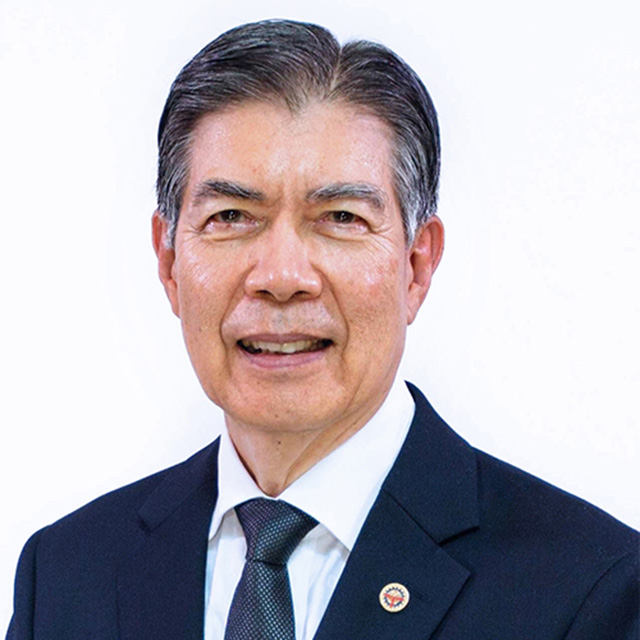
Singapore
Edwin Khew Teck Fook
NUS EMBA Class of 2001
Co-Founder/Chairman AirCarbon Pte Ltd
Chairman of the Sustainable Energy Association of Singapore (SEAS)
President, Plastic Recycling Association, Singapore (PRAS)
Edwin Khew (NUS EMBA Class of 2001) is a leading pillar of Singapore’s clean energy industry. As Chairman of the Sustainable Energy Association of Singapore (SEAS), Edwin was influential in setting up Singapore’s first clean energy incubator in the early 2010s.
He also represents SEAS on the Asian Development Bank (ADB) Energy for All Partnership’s (E4ALL) Steering Committee as its Co-Chair and Chairman of its Enterprise Development Working Group.
Edwin’s other leadership roles include being an Emeritus President of The Institution of Engineers, Singapore (IES), a Supervisory Board Member of Solar Energy Research Institute of Singapore (SERIS), a Board member of the Professional Engineers Board (PEB) Singapore and the Chairman of the Singapore Standards Council for more than ten years.
Edwin’s contributions were not confined to the private sector; he has also served as a Nominated Member of Parliament, where he was active in debates and presented papers on environmental sustainability, climate change, and issues affecting SMEs in the manufacturing sector. He was awarded the Public Service Medal in 2014.
We met Edwin to get his thoughts on the EMBA programme and the opportunities it has opened up for him.
What are you up to these days?
I’m the Chairman, Director and Co-Founder of AirCarbon Pte Ltd, a blockchain-based digital platform for trading digital carbon and investing in sustainable projects. I retired a few years ago from being responsible for a company’s bottom-line performance. However, I still serve on boards of small start-ups to medium-sized corporations, advising the CEO and the Board on growth strategies, management systems, market development, regionalisation, sustainability, and government relationships. I brought many of these qualities of corporate management with me today as I serve and lead as the Chairman/President of various not-for-profit organisations.
What made you embark on your EMBA journey with NUS Business School?
After graduating from my engineering course, I wanted to pursue an MBA at the University of Queensland, Australia, in 1972, but I had to return to serve my national service. As I progressed in my career, I did not find the time to do an MBA until I joined a large French MNC that encouraged me to improve myself and sponsored me through The NUS EMBA course. I found The NUS EMBA the most appropriate course for me in terms of time, course content, and exposure to Asian markets.
What lessons did you take from the programme, and how have these helped you in your career?
The NUS EMBA helped me a great deal in understanding the management of projects, including its complexities, leadership and managing of a large organisation. The programme also gives you the confidence to take on such projects, motivating and incentivising diverse teams to meet tight deadlines. Before the EMBA, I already had more than 20 years of senior management experience as a founder, CEO and MD of several small to medium-sized companies. Still, I was managing from experience and gut instincts and made many mistakes. On hindsight, with proper formal training undertaken through an EMBA programme, I would have planned, strategised, and managed better and circumvented many mistakes and bad judgements which I made during my 20 years of management. The EMBA training also prepared me to lead and chair large associations and corporate boards and even serving a term as a Nominated MP in the Singapore Parliament.
What is one enduring memory you have at NUS Business School?
I have two enduring memories:
- The trips the whole cohort took as part of our course to India, Taiwan and China. We learnt much from CEOs of Singapore companies and local companies who headed FMCG, technology and manufacturing companies in these geographies. They shared case studies on market peculiarities, cultural practices and issues arising from these practices, which were unique to these countries, solutions to these issues and practices, including HR problems unique to these areas.
- Memories of the close relationships and interactions forged between classmates who were put into different teams to solve case studies and lessons learnt from these classmates who were CEOs or senior executives in their own companies representing various sectors of businesses and industries. We not only learnt from our professors but from each other which was extremely valuable.
What advice would you give those just starting their EMBA journey?
I strongly recommend an EMBA programme, especially the NUS EMBA, to C-suite and senior managers keen to improve their management capabilities/skills, corporate planning and strategies for growth and expansion of his/her corporation. An EMBA also helps build confidence in taking on key roles in trade associations, chambers, and community-related organisations for voluntary work outside their corporations.
The EMBA also taught me the importance of ethics and corporate governance. In particular, I learned to apply social goals to satisfy corporate shareholders regarding the Environment, Social and Corporate Governance (ESG). All this prepares one to be a well-rounded corporate professional executive in today’s world where pandemics, economic sustainability and climate challenges have become a norm. One, therefore, needs to arm with necessary skills to manage a corporation under these challenging circumstances.